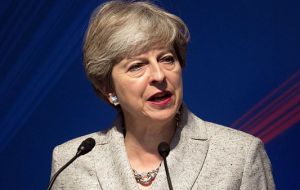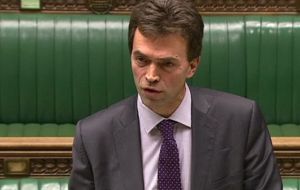MercoPress. South Atlantic News Agency
EU Withdrawal bill passed first Parliamentary test, but real battle is still ahead
 Theresa May welcomed the Commons vote saying the bill offered “certainty and clarity”, but Labour described it as an “affront to parliamentary democracy”. (Pic PA)
Theresa May welcomed the Commons vote saying the bill offered “certainty and clarity”, but Labour described it as an “affront to parliamentary democracy”. (Pic PA)  Seven Labour MPs defied Jeremy Corbyn's order to oppose the bill, and no Conservatives voted against it. .
Seven Labour MPs defied Jeremy Corbyn's order to oppose the bill, and no Conservatives voted against it. .  Shadow Brexit secretary Keir Starmer said the Bill was a “naked power grab” by the government, adding “this is a deeply disappointing result”.
Shadow Brexit secretary Keir Starmer said the Bill was a “naked power grab” by the government, adding “this is a deeply disappointing result”.  Lib Dem Brexit spokesman Tom Brake said MPs who backed the Bill should feel “ashamed”. “This is a dark day for the mother of parliaments,” he added.
Lib Dem Brexit spokesman Tom Brake said MPs who backed the Bill should feel “ashamed”. “This is a dark day for the mother of parliaments,” he added.  Justice Secretary David Lidington said some of the criticism had been “exaggerated up to and beyond the point of hyperbole”.
Justice Secretary David Lidington said some of the criticism had been “exaggerated up to and beyond the point of hyperbole”. The government's bid to extract the UK from EU law in time for Brexit has passed its first Parliamentary test. MPs backed the EU Withdrawal Bill by 326 to 290 in a Monday late-night vote despite critics saying it represented a “power-grab” by ministers.
The bill, which will end the supremacy of EU law in the UK, now moves onto its next parliamentary stage. Ministers sought to reassure MPs by considering calls for safeguards over their use of new powers.
Prime Minister Theresa May welcomed the Commons vote in the early hours of Tuesday morning, saying the bill offered “certainty and clarity”, but Labour described it as an “affront to parliamentary democracy”.
Having cleared the second reading stage, the bill will now face more attempts to change it with Conservative MPs believed to have tabled new amendments.
Previously referred to as the Great Repeal Bill, the EU Withdrawal Bill overturns the 1972 European Communities Act which took the UK into the then European Economic Community.
It will also convert all existing EU laws into UK law, to ensure there are no gaps in legislation on Brexit day. Critics' concerns centre on ministers giving themselves the power to make changes to laws during this process without consulting MPs.
The government says it needs to be able to make minor technical changes to ensure a smooth transition, but fears were raised that ministers were getting sweeping powers to avoid parliamentary scrutiny.
More than 100 MPs had their say over the course of the two-day second reading debate.
Labour, which denounced the “vague offers” of concessions, mostly voted against the bill. Shadow Brexit secretary Keir Starmer said the Bill was a “naked power grab” by the government, adding “this is a deeply disappointing result”.
He said: “Labour will seek to amend and remove the worst aspects from the Bill but the flaws are so fundamental it's hard to see how this Bill could ever be made fit for purpose.”
Lib Dem Brexit spokesman Tom Brake said MPs who backed the Bill should feel “ashamed”. “This is a dark day for the mother of parliaments,” he added.
Summing up the debate, Justice Secretary David Lidington said some of the criticism had been “exaggerated up to and beyond the point of hyperbole”. He said the bill would “enable us to have a coherent and functioning statute book” on the day the UK leaves the EU.
SNP MPs, who also voted against the bill, said powers over devolved issues would be seized by Westminster as they were returned from Brussels. But Mr Lidington denied this, predicting it would result in a “significant increase” in the powers exercised by the devolved administrations.
Seven Labour MPs defied Jeremy Corbyn's order to oppose the bill, and no Conservatives voted against it.
The bill will now receive line-by-line scrutiny in its committee stage.
MPs voted in favor of the government's proposed timetable for debating legislation - by 318 votes to 301 - guaranteeing 64 hours of debate over eight days. But Mr Lidington said the government was “willing to consider” extending the allocated time. The Bill's committee stage will take place when MPs return to Parliament after their party conferences.




Top Comments
Disclaimer & comment rules-

Read all commentsThe question is why is this piece appearing in Mercopenguin, a British government propaganda organ supposedly devoted to America, South America and the “South Atlantic”?
Sep 14th, 2017 - 04:43 am 0Commenting for this story is now closed.
If you have a Facebook account, become a fan and comment on our Facebook Page!